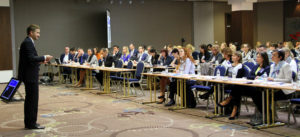David Reiling on Redefining Social Responsibility In The Financial Industry

Recently, on Alan Olsen’s American Dreams show, David and Alan talked about redefining social responsibility in the financial industry.
See David’s Recent Interview with Alan Olsen: https://www.youtube.com/watch?v=ztdtPfH9RAk&t=2s
David’s background
David Reiling is an accomplished social entrepreneur and innovator in the field of community development finance and financial inclusion.
He has been the Chief Executive Officer of Sunrise Banks since 1995, and since then, he has successfully transformed Sunrise Banks into a leading player in the industry, becoming the first Minnesota-based bank to be certified as a Community Development Financial Institution (CDFI) and a legal Benefit Corporation.
Interview addressing redefining social responsibility in the financial industry.
In this interview, David shares his journey of redefining social responsibility in the financial industry, from his early experiences to the present day challenges facing Sunrise Banks.
He discusses how Sunrise Banks has been able to create an innovative approach to client service and address social and environmental issues while remaining competitive in the financial sector.
He also offers insight into Sunrise Banks’ unique approach to responsible banking, which has enabled them to become a leader in their field.
David’s passion for social responsibility and innovative solutions is inspiring, and his story serves as an example of how we can create positive change by using technology and data-driven approaches. He has shown that with the right vision and leadership, it is possible to redefine what’s possible in the financial industry.
Social and Environmental Impact Meets Financial Institutions
David Reiling is a leader in the financial industry who has used banking to make meaningful contributions to social and environmental impact. As CEO of Sunrise Banks, he has been instrumental in transforming the bank into a Community Development Financial Institution (CDFI) and Benefit Corporation.
Through these initiatives, Sunrise Banks has provided capital to underserved markets, such as small business and affordable housing, while also addressing environmental issues such as energy efficiency.
David has also used innovation to develop unique banking products that help clients save money and make better financial decisions.
In 2013, he launched the Financial Wellness program at Sunrise Banks, a first-of-its-kind offering that provides customers with access to personalized budgeting, financial education, and access to low-cost products.
In addition, Sunrise Banks is at the forefront of using technology to provide services more efficiently and cost effectively.
Values Based Banks
Sunrise Banks has become a leader in values-based banking, a new type of financial institution that puts social and environmental impact ahead of profits. At Sunrise, David leads the charge by focusing on mission-driven investments and socially responsible banking practices.
He believes that banks should strive to be good corporate citizens by investing in their local communities and demonstrating a commitment to environmental sustainability.
Through its innovative tactics, Sunrise Banks has been able to make a positive impact while remaining financially profitable. David has shown that it is possible to create a successful business model based on social responsibility and environmental stewardship.
He believes that this approach will become more prevalent in the banking industry over time as financial institutions increasingly recognize their role in creating a better future.
To view more content like this, click here to subscribe to our YouTube channel
And click here to receive our FREE Newsletter.


Thank You!

How to Organize a Seminar or an Event
By Matt Bacak Seminars and events have always been implemented as a holistic experience for participants. Thus, organizing a seminar an event requires extensive planning and preparation with most work implemented at least a few months before the actual event. Most of the time, seminars seem to run like clockwork with all events flowing smoothly…
Real Estate Agents are Same as Brokers for “Real Estate Professional Rule” for Passive Losses
Real Estate Agents are Same as Brokers for “Real Estate Professional Rule” for Passive Losses Taxpayer victory in Tax Court Real estate agents can claim the real estate professional exception to the passive loss limitations. The I.R.S. tried to argue that the taxpayer needs to be a “Broker” not a just an “Agent” to meet…
10 Tips to Reduce Your Tax Burden
10 Tips to Reduce Your Tax Burden Updated: 1/3/13 With the start of a new year, tax season will soon be upon us. For 2012 returns, the tax filing deadline is April 15, 2013. Now is a good time to look for tax reduction strategies in preparation for filing your tax return. Here are ten…
Avoiding the AMT Trap
Avoiding the AMT Trap Updated: 10/23/2014 More and more taxpayers are finding a hidden tax on their individual tax returns. The alternative minimum tax (AMT) attempts to ensure that high income individuals who benefit from the tax advantages of certain deductions and exemptions will pay at least a minimum amount of tax. This tax was…




